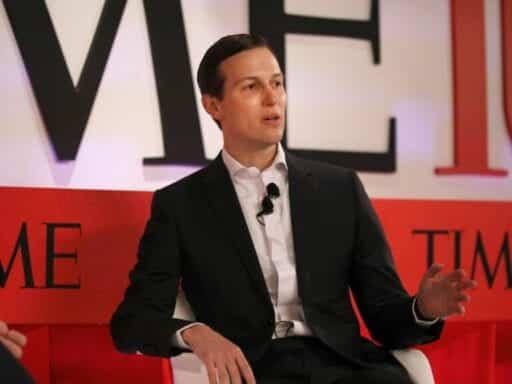He says it was just “a couple Facebook ads.” He’s not telling the truth.
To hear White House adviser Jared Kushner tell it, Russian interference in the 2016 presidential election didn’t amount to more than a couple of ads on Facebook, and anyway, as another Trump administration official said, President Donald Trump repeatedly denounced it.
But neither of those claims is true.
Kushner downplayed Russia’s interference campaign during his first public comments since the Mueller report was released last Thursday — an interview with Time magazine during the Time 100 Summit in New York City. He went as far as to claim that the investigations into Russian interference have been more harmful to the country than Russia’s attack on American democracy.
“You look at what Russia did, buying some Facebook ads to try to sow dissent and do it, and it’s a terrible thing,” Kushner said. “But I think the investigations and all of the speculation that’s happened for the last two years has had a much harsher impact on our democracy than a couple of Facebook ads.”
Watch:
Here’s video of Jared Kushner downplaying Russian interference as “a couple Facebook ads,” and saying he thinks “the ensuing investigations have been way more harmful to our country.” pic.twitter.com/JkiIjQng48
— Aaron Rupar (@atrupar) April 23, 2019
Kushner is mentioned in Mueller’s report. A lot.
Kushner is hardly an unconflicted source when it comes to Russia’s interference campaign. He was in the room during the infamous June 2016 Trump Tower meeting between a Russian lawyer who had promised dirt on Hillary Clinton as “part of Russia and its government’s support for Mr. Trump” and suggested creating a secret back channel to communicate directly with the Kremlin, going around US intelligence. He’s mentioned many times in Mueller’s report for these and other activities that still have not been fully explained.
Despite what Kushner said on Tuesday, it is not the case that Russian interference didn’t go beyond a handful of Facebook ads. According to information released by the House Intelligence Committee last year, Russian agents actually purchased about 3,500 Facebook ads during the 2016 presidential campaign, spending more than $1 million a month to reach about 10 million users. Meanwhile, Russian agents also purchased ads on Instagram and created thousands of bot accounts on Twitter that almost exclusively spread propaganda aimed at helping Trump by damaging Hillary Clinton.
Beyond that, Kushner’s comments on Tuesday completely ignore the Kremlin-orchestrated hacking campaign against Democratic targets — hacks that resulted in WikiLeaks publishing tranches of emails online during key stretches of the 2016 campaign. Trump mentioned WikiLeaks about five times a day during the closing weeks of the campaign, but recently claimed he “know[s] nothing about WikiLeaks … it’s not my thing.”
Kushner added that “one thing the Mueller report was very conclusive on was there was absolutely no coordination or collusion with the Trump campaign. Everything the president’s been saying and I’ve been saying for two years has been fully authenticated.”
In fact, the Mueller report says that the Trump campaign “expected that it would benefit electorally from information stolen and released through Russian efforts,” which amounted to a “sweeping and systematic” interference campaign. Kushner’s name is mentioned 263 times.
Meanwhile, a White House spokesperson claimed Trump has repeatedly denounced Russian interference. He hasn’t.
While Kushner was downplaying Russian interference in New York City, Trump administration spokesperson Hogan Gidley was back at the White House falsely claiming that Trump has denounced Russian interference “multiple times.”
When did potus “denounce” Russian involvement? https://t.co/ldFugDiyGY
— Maggie Haberman (@maggieNYT) April 23, 2019
But as Maggie Haberman of the New York Times alluded to in the above tweet, Trump has done nothing of the sort. In fact, during his infamous news conference with Vladimir Putin in Helsinki, Finland, last summer, Trump indicated that he took Putin’s word for it that Russian didn’t interfere above the conclusion of his own intelligence agencies.
“My people came to me, Dan Coats came to me and some others they said they think it’s Russia,” Trump said. “I have President Putin; he just said it’s not Russia. I will say this. I don’t see any reason why it would be, but I really do want to see the server.”
The White House quickly tried to walk Trump’s comments back, but it was far from the only time the president sounded a skeptical note about the intelligence community’s conclusion that Russia interfered on his behalf. By contrast, Trump has repeatedly and forcefully denounced the investigation into Russian interference, including even after Mueller wrapped up his work.
When Gidley was asked whether Trump would once again accept Russia help in 2020, he notably did not say “no,” adding, “I don’t understand the question.” Gidley’s comments came two days after Trump’s personal lawyer, Rudy Giuliani, went on a number of Sunday morning news shows and made a case that “there’s nothing wrong with taking information from Russians,” completely ignoring that the information in question was acquired through crimes committed against American citizens.
The news moves fast. To stay updated, follow Aaron Rupar on Twitter, and read more of Vox’s policy and politics coverage.
Author: Aaron Rupar
Read More



